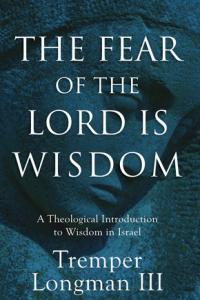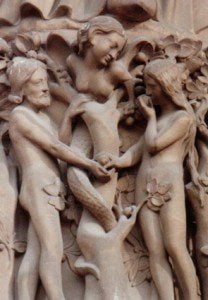 Tremper Longman III has a new book out, The Fear of the Lord is Wisdom. The role of wisdom in Israelite and Jewish thought is a fascinating topic. This theme may change the way we view some passages of the Old Testament as well as their application to the New Testament. In the prologue Longman writes “This book intends to explore wisdom in the Bible. We will focus on the OT, Israel’s wisdom. Ultimately, however, our study is a work of Christian biblical theology; thus, we will continue by examining how the NT appropriates the wisdom of the OT.” (p. xiv)
Tremper Longman III has a new book out, The Fear of the Lord is Wisdom. The role of wisdom in Israelite and Jewish thought is a fascinating topic. This theme may change the way we view some passages of the Old Testament as well as their application to the New Testament. In the prologue Longman writes “This book intends to explore wisdom in the Bible. We will focus on the OT, Israel’s wisdom. Ultimately, however, our study is a work of Christian biblical theology; thus, we will continue by examining how the NT appropriates the wisdom of the OT.” (p. xiv)
I will be digging into this book on occasion but, in line with a running theme on this blog, I would like to start by jumping straight to chapter six and considering the role of wisdom in Genesis 3, the story of the serpent, the woman, and the man (adam). The story starts with the serpent accosting the woman and convincing her to eat from the forbidden tree. In Genesis 2 the man was told “You are free to eat from any tree in the garden; but you must not eat from the tree of the knowledge of good and evil, for when you eat from it you will certainly die.” The woman knew this for she responded to the serpent acknowledging that this was a forbidden tree. (Gen 3:2-3) The story continues:
“You will not certainly die,” the serpent said to the woman. “For God knows that when you eat from it your eyes will be opened, and you will be like God, knowing good and evil.”
When the woman saw that the fruit of the tree was good for food and pleasing to the eye, and also desirable for gaining wisdom, she took some and ate it. She also gave some to her husband, who was with her, and he ate it. Then the eyes of both of them were opened, and they realized they were naked; so they sewed fig leaves together and made coverings for themselves.
 Many aspects of this story point to the motif of wisdom; the name of the tree, the description of the serpent, the woman’s hope to gain wisdom, the paradoxical sense that “the knowledge of good and evil” is something that is not good for the woman and the man in the garden. The latter is somewhat perplexing. Why should the humans not have knowledge of good and evil? Longman comments:
Many aspects of this story point to the motif of wisdom; the name of the tree, the description of the serpent, the woman’s hope to gain wisdom, the paradoxical sense that “the knowledge of good and evil” is something that is not good for the woman and the man in the garden. The latter is somewhat perplexing. Why should the humans not have knowledge of good and evil? Longman comments:
But God has forbidden the “knowledge” symbolized by the tree from his human creatures, showing that “knowledge” (da’at) like “prudence” (‘ārum) is not always beneficial. Indeed, we must ask, what is the knowledge that the tree promises to deliver if the fruit is eaten? … At this point we need to remember that knowledge is more than intellectual apprehension; it involves experience. By eating the fruit of the tree, Adam and Eve are not gaining new information; they rather arrogate to themselves rather than to God the right to define moral categories. God has told them it was wrong to eat of the fruit, but in the act of eating it, they reject God’s authority and assert their own right to determine what is right and wrong. (p. 95)
The humans are grasping for wisdom on their own terms and grasping for wisdom apart from God leads to sin. Longman also refers to the oracle in Ezekiel 28 where the king of Tyre is said to have been in the garden of Eden (v. 12-13). This oracle may help us better understand the message of Gen. 3. Longman draws a connection between the king and Adam, both of whom were originally wise.
However, wisdom is not permanent; one can lose it. And the trigger to the loss, at least in this case, is pride, a turning to the self. Pride attributes wisdom and its benefits to oneself: “because you think you are wise, as wise as a god” (Ezek. 28:6). We saw that Adam and Eve exercised their pride by asserting their moral autonomy in the garden. They no longer cared about what God said was right and wrong, but they arrogated to themselves the right to define moral categories.
However, the object lesson of both the king of Tyre and Adam in the garden is that wisdom comes only in submission to God. (p. 100)
Perhaps the story of the man and the woman in the garden is not so much a story about a crafty serpent and a magical tree as it is the story of the proper origin and focus of wisdom.
Is wisdom and the loss of wisdom a theme in Genesis 3?
What is the purpose of this story in the opening chapters of Genesis?
If you wish to contact me directly you may do so at rjs4mail [at] att.net.
If interested you can subscribe to a full text feed of my posts at Musings on Science and Theology.














